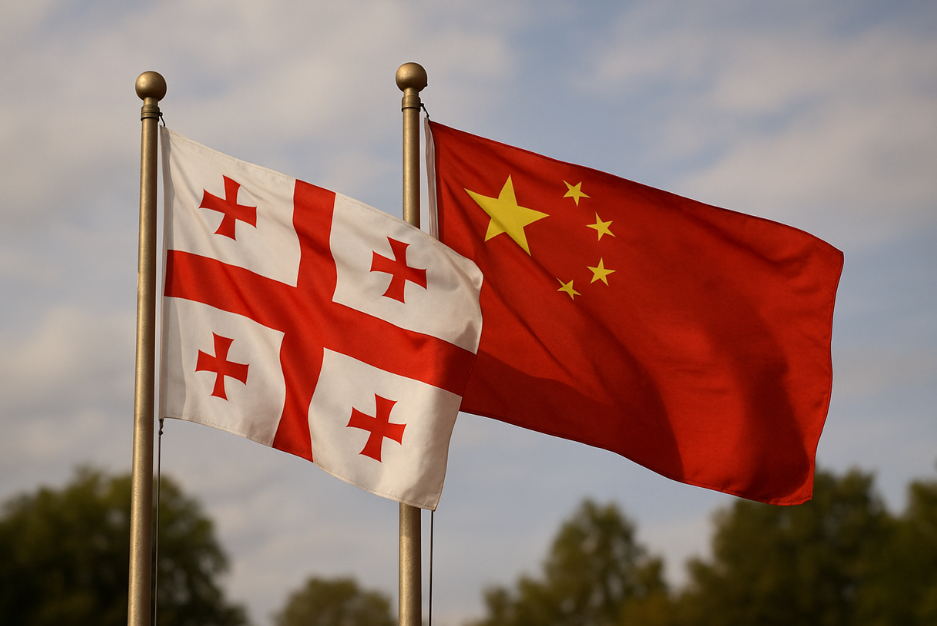When Moscow’s shadow fades: China’s expanding influence in Georgia

Introduction
The geopolitical landscape of the South Caucasus is undergoing a historic transformation. Russia’s long-standing unchallenged dominance has visibly eroded due to the war in Ukraine and the resulting international sanctions. In this context, a new actor is asserting itself with confidence: China. Beijing is strategically leveraging the emerging vacuum to advance its Belt and Road Initiative (BRI) in the Black Sea region and along the Middle Corridor. For Georgia, strategically situated between Europe and Asia, this development presents a rare opportunity to redefine its economic and foreign policy role.
Against this backdrop, this short article analyzes the Georgian-Chinese rapprochement and its geopolitical implications. Central questions include the political and economic objectives pursued by the Georgian government through its cooperation with China and the extent to which this partnership enhances Georgia’s strategic autonomy vis-à-vis Russia. The article also examines how Russia perceives China’s growing influence in the South Caucasus and assesses the risks and opportunities for Georgia regarding its aspirations for EU and NATO integration. In sum, it seeks to determine whether Georgia can strike a balance between economic modernization, geopolitical autonomy, and sustained Western orientation.
Georgia in the context of waning Russian dominance
Historically, Georgia has served as a vital link between Europe, Asia, and the Caucasus, making it strategically significant for Moscow. Russia exercised direct influence over Georgia’s political, economic, and military spheres, reinforced by its control over the breakaway regions of Abkhazia and South Ossetia.
The war in Ukraine, coupled with international sanctions, has considerably constrained Moscow’s leverage in the South Caucasus. While Russia’s presence in the region remains tangible and strategically relevant, its ability to decisively shape Georgia’s policy choices has diminished compared to pre-war levels. Analysts view this as a historic window of opportunity for other powers, particularly China, to advance their economic and strategic objectives (Popkhadze 2025).
China’s strategy in Georgia
Infrastructure Projects and the Belt and Road Initiative: China is strategically investing in infrastructure projects to position Georgia as a central hub in Eurasian trade. A key project is the planned deep-sea port in Anaklia on the eastern coast of the Black Sea, where a Chinese-Singaporean consortium is slated to invest approximately USD 2.5 billion. The goal is to establish Georgia as a pivotal transit point connecting China, Central Asia, and Europe.
Additionally, major railway lines and roads are being modernized, including the Tbilisi–Batumi line and the Kvesheti–Kobi route. These projects are integral to the BRI and serve China’s long-term geopolitical and economic ambitions.
Trade and Economic Relations: China has become Georgia’s fourth-largest trading partner, with bilateral trade reaching around USD 1.91 billion in 2024, reflecting an 8% increase from the previous year. Since 2012, trade with China has more than doubled. As of 2024, Chinese citizens had registered 1,893 companies in Georgia, four times more than before 2013. Foreign Direct Investment from China increased fivefold compared to 2003–2012, reaching USD 600 million (Transparency.ge 2025).
A landmark symbol of rapprochement is the visa-free agreement signed on May 28, 2024, allowing Chinese and Georgian citizens to travel for up to 30 days without a visa (MFA Georgia 2024). Following this agreement, the number of Chinese tourists visiting Georgia increased by approximately 40% within a year, bolstering not only the tourism sector but also economic and cultural ties.
Political Dimension: China maintains diplomatic neutrality regarding Georgia’s territorial conflicts, as evidenced by UN votes on Abkhazia and South Ossetia. In the most recent UN General Assembly resolution on June 3, 2025, affirming the return rights of internally displaced persons from these regions, China abstained from voting (Georgia Today 2024). This stance is perceived in Tbilisi as an opportunity to foster economic cooperation without engaging in direct geopolitical confrontation with Russia.
Georgia’s Expectations and Strategic Calculus
The Georgian government pursues a multi-dimensional strategy in its engagement with China:
Economic Modernization: Chinese investments in infrastructure—including railways, roads, and the Anaklia deep-sea port—aim to drive growth, create employment, and integrate Georgia more fully into global supply chains. The broader objective is to develop the Middle Corridor as a transcontinental transit route and position Georgia as a regional logistics hub.
Strategic Diversification: After decades of close dependence on Russia, Tbilisi seeks alternative partners. Cooperation with China provides additional foreign policy options and serves as a counterbalance to Russian influence, without fundamentally challenging Georgia’s Western orientation. In 2023, Georgia officially became a strategic partner of China, focusing on strengthening political, cultural, and economic ties.
Risk Management: The government recognizes that overly tight economic ties with China could compromise political independence. Long-term credit and investment agreements carry the risk of translating economic dependence into political leverage. Accordingly, Georgia aims to balance Chinese projects with EU support and Western investments. In essence, Georgia’s strategy seeks to simultaneously capitalize on economic opportunities, expand geopolitical flexibility, and mitigate dependency risks.
Reactions from Russia and the EU
Russia: Ambivalent perception
Russia views China’s growing economic engagement in Georgia as a potential competitor, yet tolerates it as long as its core security interests remain secure. This has resulted in a pragmatic coexistence: while Moscow continues to wield military leverage through its de facto control over Abkhazia and South Ossetia, China is largely allowed to expand its economic footprint.
This economic presence has strengthened Moscow’s informal influence, particularly through real estate investments and increased remittances, creating channels that allow Russia to remain relevant in Georgian domestic affairs. In 2023, Russian citizens registered a record 13,000 businesses in Georgia, reflecting the country’s role as a refuge for Russian entrepreneurs seeking alternatives amid Western sanctions (Menabde 2024).
At the same time, Russia’s broader geopolitical influence in the South Caucasus is declining. The 2024 withdrawal of Russian peacekeepers from Nagorno-Karabakh marked a tangible reduction in Moscow’s military presence, signaling the limits of its regional power projection. Moreover, the Kremlin’s capacity to actively shape developments in Georgia is constrained by the ongoing war in Ukraine and international sanctions (Kluge 2024).
China’s economic initiatives in Georgia—such as infrastructure investments and trade expansion—introduce a new strategic actor whose growing presence Moscow can neither fully control nor openly challenge, highlighting the complex and ambivalent nature of Russia’s response.
EU: Balancing support and caution
In December 2023, Georgia was granted EU candidate status, marking a major step toward European integration. However, the EU has made it clear that progress depends on concrete reforms in the areas of rule of law, media freedom, and transparency. For example, the 2024 “Law on Transparency of Foreign Influence” requires NGOs and media outlets receiving more than 20% of foreign funding to register as “foreign agents.” EU officials, including Ambassador Pawel Herczynski, criticized the law as “incompatible with EU norms and values,” warning that it could stall Georgia’s EU membership process (Gray/Light 2024). Similarly, EU High Representative Josep Borrell emphasized that such legislation contradicts core EU principles, particularly regarding civil society and media freedom (EC 2024).
As a result of these concerns, the EU has withheld over €120 million in aid to Georgia, citing “backsliding on democratic standards” (Reuters 2024). EU officials stress that continued engagement with Georgia is contingent on meeting specific political and legal benchmarks, including reforms in elections, transparency, and minority rights (The Guardian 2024).
By contrast, China’s approach to Georgia is markedly different. Chinese investments—such as the Anaklia Deep Sea Port and transport infrastructure projects along the Middle Corridor—come with no explicit political conditions or requirements regarding domestic reforms. Beijing maintains a policy of non-interference, focusing purely on economic and strategic cooperation. Chinese officials have consistently refrained from commenting on Georgia’s internal politics or EU-related reforms, in contrast to the EU’s explicit conditionality. This contrast illustrates a central tension in Georgia’s foreign policy calculus. While the EU ties its support and integration prospects to democratic standards, transparency, and rule-of-law reforms, China provides an alternative source of investment and development without imposing political prerequisites. (Popkhadze 2023).
In this context, Georgia must balance its strategic engagement: leveraging Chinese investment to advance economic modernization while adhering to the EU’s conditions to maintain long-term prospects for membership. The differing approaches of the EU and China highlight the broader geopolitical complexity facing Tbilisi, as it navigates between economic pragmatism and political integration.
Conclusion
The Georgian-Chinese partnership vividly illustrates shifting power dynamics in the South Caucasus: as Russia’s influence wanes, China leverages economic instruments to expand its foothold. For Georgia, this presents an opportunity to enhance its economic and geopolitical position while navigating the complex landscape between Russia, China, and the EU. Moscow observes China’s growing influence with ambivalence.
On one hand, Russia formally supports a “strategic partnership” with Beijing and welcomes any diminution of Western presence in its neighborhood. On the other hand, China’s steadily increasing economic weight—through infrastructure investments, transit projects, and trade agreements—fuels concerns that Russia could be gradually sidelined.
Russian leadership recognizes that Chinese capital and diplomatic engagement provide South Caucasian states with new options, potentially weakening Moscow’s leverage.
For Georgia, engagement with China is not merely an economic calculation but also a strategic safeguard. Tbilisi anticipates multi-billion-dollar infrastructure investments, the strengthening of the Middle Corridor as a transit route between Europe and Central Asia, and the expansion of trade relations, which already make China one of Georgia’s most important economic partners. At the same time, the Georgian government views its partnership with Beijing as a counterweight to Russian pressure and an additional pillar alongside its long-standing EU and NATO ambitions.
In the coming years, the critical question will be whether Georgia can fully capitalize on the benefits of cooperation with China without compromising its long-term strategic orientation.







